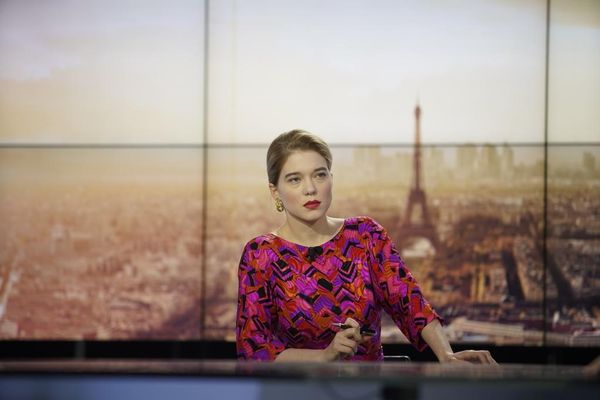Eye For Film >> Movies >> France (2021) Film Review
France
Reviewed by: Anne-Katrin Titze

Léa Seydoux plays France de Meurs, star anchor of a news programme for the I channel. She jets to war zones, where she interviews puzzled refugees or soldiers instructed to react a certain way to staged situations. There is always a safe haven nearby for her and the crew, something with a swimming pool and cocktails, and back she flies to Paris to report to her many fans who don’t miss a chance to get a selfie, should they encounter her on the street.
Even scarier than the scenes of fake news and constructed disaster are Bruno Dumont’s depictions of France’s private life, which seems to be a result of her professional need to lie and deceive day in and day out. How could it be otherwise - one rot begets another. France is a supremely sad film, maybe the saddest Dumont has made in its interplay of the true and the fake.

There is France’s personal assistant Lou (Blanche Gardin), who emerges fully formed out of the land of PR hell. She embodies a certain type to a T with her snickers, her vaping, the way she holds her phone - the ultimate cynical sycophant who knows that the truth is of no importance whatsoever and will never be taken into consideration by her. Gardin’s Lou hovers, laughs, is nourished only by social media and embodies the monstrosity of our age.
Dumont skewers the hypocrisy of the television news world and rotates his protagonists slowly over the fire. The master director of casual cannibalism, singing saints, and floating detectives has his own take on the artifice of staged imagery, when lives are at stake and the world needs sincerity more than ever. France never wears the same expensive designer outfit twice (costume design by Alexandra Charles). The slinky jewel-tone dresses, the short skirts, and luxurious turtlenecks are juxtaposed with the army fatigues and headscarves just so to emphasise the two sides of her job that are in conflict.
France’s son Jojo (Gaëtan Amiel) is beholden to his phone and gives tokens of affection only for money or TV access. The family lives in an apartment that resembles an art-filled morgue, where the living dead gather to talk about France’s novelist husband Fred (Benjamin Biolay) and the author photo he chose for his latest novel essay book. She earns five times more than he does, which for Fred justifies all his anger. When France accidentally hits a man on a motorbike, Baptiste (Jawad Zemmar), in traffic, she seems to have an awakening of sorts. After being non-stop in the public eye, she decides to quit her job and retreats to a sanatorium in the Alps for some rest and reshuffling of the soul.
This is not the Magic Mountain and the mental health patients France encounters do not resemble those described by Thomas Mann. A grimacing Juliane Köhler as a hyper German woman is convinced that Angela Merkel, whom she refers to as “the kenzelor”, is one of the patients at the resort. And why not? We know that anything is possible since in an early scene with clever editing the real Emmanuel Macron had an interaction with the faux France. Instead of finding comfort in the perfectly wrapped blankets of old, France seeks refuge in a stranger, Charles Castro (Emanuele Arioli). Dumont clearly plays with the name. He is not Mann’s Hans Castorp, but says he teaches Latin, doesn’t know her fame, and sings to her about the coming apocalypse.
His chant in the snow is a classic Dumont moment that triggers an emotional switch. It is surprising, disturbing and sublime. Everything becomes bigger, reaches another realm and then, maybe, doesn’t. I am not exactly sure what to make of France, the film. The anger and the lies, the way we see that the news isn’t news and love isn’t love, a child isn’t a child and a friend isn’t a friend. The camera often rests on Seydoux’s face as she is staring into nothingness, crying fake or real tears, which may be the same. The music (by Christophe), as always with Dumont, carefully placed, oscillates between Hitchcockian elegance, wailing scream and ticking time bomb.
The first time we see France in a “war zone” she snaps at the person she interviews as if he were an unruly, slightly stupid puppy. The limited number of homeless people she feeds once in a blue moon as a publicity stunt annoy her, and the woman who lived with a monster for 20 years leaves her cold. Is there a soul there? In his film Slack Bay (Ma Loute), Dumont let the Van Peteghem family utter the perfect sentence: “We know what to do, but we do not do.” Does this apply to France? People in need parade by, anger explodes right outside the window.
In TS Eliot’s The Love Song of J Alfred Prufrock, “In the room the women come and go / Talking of Michelangelo.” In the TV studio in France, the politicians and journalists come and go and talk of Bertolt Brecht and look alike and feel alike. And France, with the Deneuve hair and the silk blouses, smiles and says, “It’s my style” and amen. “Let’s go to Dior,” suggests Lou with her smirk, and let’s pretend that you’re vegan so that the Ambassador doesn’t serve you the dreaded ortolans.
France's victim Baptiste’s overly grateful immigrant mother at one point in the film calls herself “unabled”, a very true made-up word that holds meaning in some way or another for them all. The media circus dances feverishly around vulnerability and its exploitation. There is one moment where Seydoux, dressed in a one-piece bathing suit, walks from the pool in the desert towards the camera, covering her body with a sarong. It is a shot of a woman supremely uncomfortable that makes you wonder if it isn’t the director’s cruelty flickering through.
Reviewed on: 13 Nov 2021














